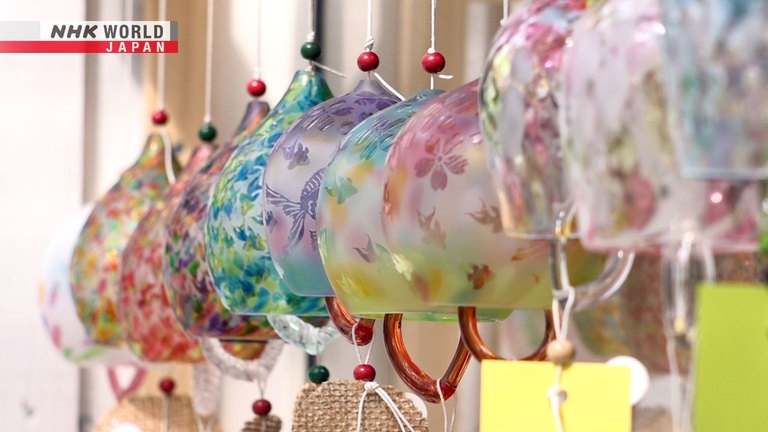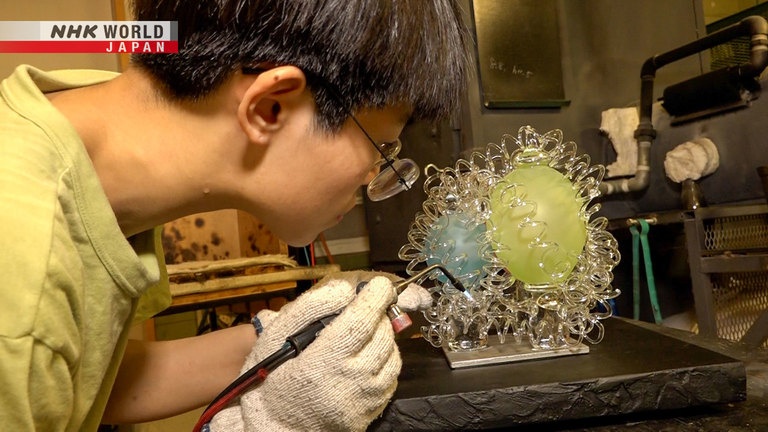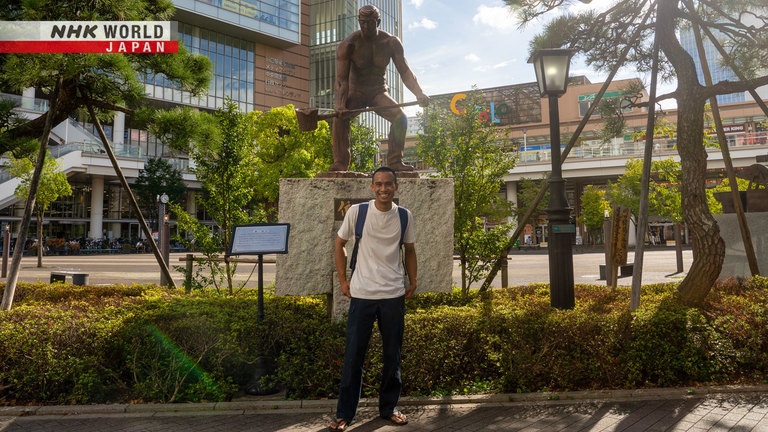A New Breeze in Otaru Glassware
The city of Otaru in Hokkaido Prefecture is famous for its glass making tradition more than a century old. Fascinated by Otaru glassware, Chen Yu-Chin moved here from her native Taiwan to train to become a glass artisan herself. After only a year, she was already an award-winning glass artist! On this episode, we follow Yu-Chin as she prepares her latest piece for an upcoming art exhibition. We also drop by a factory in Kawaguchi, Saitama Prefecture, to meet Indonesian Nursalam Hidayat, who trains as a metal caster.




Transcript
Where We Call Home.
Glassware from Otaru in Hokkaido - a craft with more than a century of history.
Drawn to it beauty, this Taiwanese woman moved to Japan.
Glass artist Chen Yu-Chin.
When making a glass piece,
we don't touch it directly.
I find it interesting to create
something within that restriction.
Turning my ideas into physical objects
is truly rewarding.
Her colleagues of six years are like family to her.
With her unique imagination and technique,
Yu-Chin is like a fresh new breeze in Otaru glassware.
She's now working on her next creation.
What message will she try to convey?
Let's tag along to find out!
Otaru in Hokkaido Prefecture long flourished as a trading hub.
With its western-style buildings and nostalgic townscape,
the city draws in many tourists from in and out of Japan.
Many are eager to take home a piece of Otaru glassware.
In addition to colorful dishes are jewelry and other accessories
with designs each more innovative than the next.
One local workshop lets visitors try their hand at glassware making.
As you spin it with your fingers...
place it in your mouth, it's not hot,
and blow hard.
Keep blowing.
Here instructing a customer is glass artist Chen Yu-Chin.
Otaru glassware is made through glassblowing.
The artisan places a lump of molten glass at one end of a pipe
and blows into the other end to inflate and shape the piece.
It's lovely!
Finished!
The shop's owner and head craftsman is Otaru-born Baba Masaki,
who's been producing glassware for more than twenty years.
Thanks to his masterful and delicate use of color and dynamic shapes,
his work has also gained popularity in places outside of Japan, such as Taiwan.
It's in fact Masaki's work that inspired Yu-Chin to come to Japan.
Learning the piano and flute from an early age through to her university years,
Yu-Chin had dedicated herself solely to music.
That's when she saw Otaru glassware for the first time.
I worked at a Japanese products fair.
Masaki was at the stall next to mine.
Customers kept coming to see his work.
I was curious so I checked it out.
It was glassware like
I'd never seen before.
It was unbelievable.
The colors were particularly beautiful.
Having fallen in love with Masaki's work, Yu-Chin decided to come to Japan in 2018,
and, wishing to learn the art of glassware crafting, she became his apprentice.
Shinseki Chihiro from Yamagata Prefecture has been helping Masaki run the workshop since it opened twenty years ago.
Making glassware often requires two people to work in tandem.
Mutual trust is therefore crucial.
I don't get angry, but even if I did,
Yu-Chin would smile and not be dejected.
Unusual, right?
But I think...
it's the right attitude.
The three of them share a passion for music.
It's in fact another way for them to communicate and synergize.
The trio is often invited to perform at local festivals and other events.
For Masaki, Yu-Chin and Chihiro are like family.
He even invited them to celebrate his mother's seventieth birthday.
- Happy birthday!
- Thank you!
I'm getting old!
Here's your present!
It's a different color.
- It's very cute.
- Really? Thank you!
It'll suit you.
Really?
It's lovely.
Thank you.
It's cute.
Thank you.
All warmly welcome Yu-Chin, who pursues her dream in a country
where the language and culture are so different from her own.
In the morning...
I put on my favorite music.
It's fun, right?
Life is so short.
Might as well enjoy ourselves.
In addition to crafting the products sold at the workshop,
Yu-Chin also works on her own artistic production.
This autumn, she'll be taking part in a prefectural exhibition
for which she has to produce a new art piece.
Crafting Otaru glassware is said to take over ten years to master.
Yet Yu-Chin made tremendous effort, and only a year into her apprenticeship,
she received an honorable mention at Hokkaido's biggest art show.
This June, she received another prize, this time with an innovative piece
that makes use of her original technique of assembling helix-shaped parts.
Yu-Chin imparts her thoughts on current and historical social issues into her creations.
This glass sculpture expresses her concern over cloning technology.
In our world today, it's become too easy
to make copies of things...
like meat and vegetables,
and eventually even humans.
In the process of being duplicated
does the essence remain?
Or does copying produce only empty husks?
That question turned into this design.
Her sensitivity and ideas
are so different and unique.
She always surprises us.
It's quite fascinating.
Just like her previous piece,
Yu-Chin wants her new creation to also feature corkscrew-shaped glass rods.
She's already come up with a concept.
At the core, there'll be three pieces
of colored glass.
They'll be in a cocoon of helixes
in the shape of a drop.
It'll symbolize people all over Asia
becoming friends, united as one.
The three orbs at the core represent the different countries of Asia,
and the cocoon of swirls are the thoughts and feelings of people, symbolizing their prayer for peace.
Her inspiration for this theme came from having long reflected on
the history of Taiwan and her own identity as a Taiwanese.
Current tensions between the US and China regarding Taiwan
have Yu-Chin further worried about the future.
- Look at this.
- A surveillance drone.
They come to Taiwan from China every day.
- Taiwan is getting weapons again.
- From the US?
This can only mean one thing:
they're preparing for war!
- Your theme asks, 'Why does war happen?'
- That's right.
Is it for one's own country?
I just happened to be born Japanese...
and you were born Taiwanese.
That's just superficial.
- We're all human.
- Yes.
That's the concept for
this new piece I'm making.
With conflicts raging around the world,
Yu-Chin wants to stress in her work the importance of striving to live together in harmony.
For the first time in four years, Otaru is holding its famous glass market.
From intricately crafted cut glass pieces to crystal with a cracked texture effect,
the sheer variety is astounding.
How cute.
Yu-Chin browses the stalls, letting herself be stimulated
by all the styles, techniques and ideas.
- They're lovely.
- Thank you.
How do you make them?
Piquing her interest are bird-shaped brooches.
She can't help but ask how they're made.
We shape the body and wings
with a burner like this.
We make the patterns like this.
We stretch and shape this with a burner.
When I have some time off,
I travel around Japan.
I go to places with a long history.
- And I buy local handcrafted pieces.
- "Not only glass?"
Yes, like pottery and paintings.
I love to visit the craftspeople's
workshops and talk with them.
Yu-Chin's workshop too exhibits at the market.
She puts her best effort into promoting the appeal of Otaru glass.
Which one?
You know 'love at first sight.'
It's important.
Yes.
A customer told me something.
She said, 'You might have a bit of
difficulty speaking fluently in Japanese...
but your smile says it all.'
Many customers said, 'Your sincerity
shines through.' I'm so happy.
- Here you are!
- Thank you!
- Thank you so much!
- Thank you. Bye!
Work on Yu-Chin's new project is progressing.
But she seems unsure about what to do next.
I don't know.
This line looks nice, from this angle.
- It all floats.
- "It floats?"
Yes, it flows this way.
I don't want to overdo it.
But I might have to.
I'm stuck.
What shall I do?
I don't know.
When she hits a wall, she asks Masaki for advice.
Attach some long, uncut pieces.
Then shape them with your burner.
Attach them, then gradually bend them.
Alright.
She tries to do as he suggested...
Nope!
"Doing it over?"
I'm not sure I understood what he meant.
So, I won't do that.
I asked for advice.
- You follow some of it.
- Yeah, and the rest...
I told her to try something,
but she didn't.
- It's OK?
- You should do it your own way.
Masaki, Chihiro and Yu-Chin put a lot of importance
in respecting one another's ideas and individuality.
Trying to understand each other
and get along is most important.
People's cultures
and ways of thinking differ.
Here, we have three different viewpoints.
We try to understand
and respect each other.
I think this is it.
It's done!
Finally, the piece is complete.
She added the Japanese word "wago," or "harmony," in the title
to convey her wish for the hearts of people around the world to beat as one.
I want people all over the world
to be friends.
If I have friends in, say, South Korea,
I won't want to fight with South Korea.
At the workshop, we value and respect
one another's way of thinking.
I'm an apprentice, but I don't simply
accept Masaki's opinion unconditionally.
We discuss on equal grounds.
I think it can be the same
with relations between countries.
- It's nice.
- Yes.
It came out really nice.
It's because I came to Japan that
I developed these ideas and originality.
Masaki, Chihiro and I think alike.
If it weren't for that, I wouldn't have
stayed here such a long time...
and I wouldn't have created my artwork.
I'm so thankful.
Thriving in a workplace where she and her colleagues value each other's originality,
Yu-Chin continues to imbue thoughts and feelings into glass.
Hi, I'm Hidayat from Indonesia.
I cast metal in Kawaguchi.
I strive to do quality work!
"Kawaguchi, Saitama."
"For over 100 years, casting
has been a major local industry."
"The metal factory where Hidayat trains
employs 15 workers."
"7:30 a.m.
arriving at work."
Good morning!
"8:00 a.m.
morning assembly."
Good morning!
Watch out for the heat.
Be sure to take breaks.
Make sure to rest, take care of yourself.
Let's do our best!
"This factory manufactures products like
machinery parts, dishes and kitchenware."
"8:30 a.m."
"Hidayat readies the molds
in which aluminum will be cast."
"He then prepares the aluminum
that'll be cast into the molds."
"He heats the molten aluminum to 750℃."
It's hot.
It's really hot when pouring
the 750℃ molten aluminum.
"He mustn't pour too fast,
otherwise pockets of air will form."
I change t-shirts twice a day.
I drank 3L this morning.
"As a boy, Hidayat was interested
in Japanese cars and tech."
"After high school in 2018,
he trained to work in Japan."
"In 2019, he came to Japan
as a technical intern trainee."
At first, the heat was a shock.
The molten aluminum was heavy and hot.
My hands were shaking.
I gave up three or four times.
I wasn't intimidated by Uchida-san.
He's so funny.
I was a bit scared when I saw
Hidayat's resume photo.
He has very strong features.
But when we met, he left such
a nice impression. He always smiles.
He's really a great trainee.
We need trainees like him
to be able to operate.
"12:00 p.m.
lunchtime."
Here's my lunch.
I made a lot,
so I'll share with others.
Here. Try some Indonesian food.
Oh, nice!
I made it.
Well done.
This is made from beans.
It's a little spicy.
It's good!
"3:30 p.m."
"The aluminum has cooled.
Time to take it out."
"They completed some 200 machinery parts."
They're parts of the mechanism
in ATMs that pulls in bills.
"The parts will be shipped nationwide."
My treasure is this photo.
Looking at it motivates
me to keep working hard.
Sometimes, when my mother's
not feeling too well...
I get homesick.
"Hidayat calls his parents
about three times a week."
I was cooking some fish!
She's preparing two fish dishes.
I want to eat them, but I can't.
When I joined, I knew nothing.
My seniors taught me.
Little by little, I learned the process.
My colleagues and seniors are so kind.
I'm so thankful for this company.
"In the future, Hidayat will teach
what he's learned to his juniors."